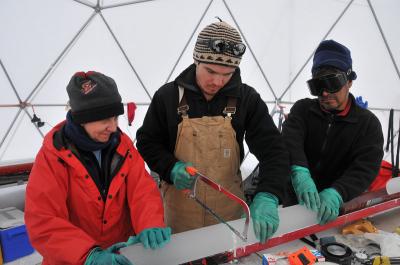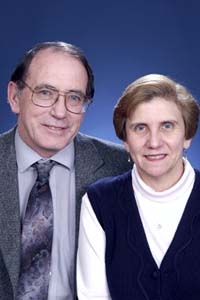|
In good companyThompsons to receive prestigious award given to Einstein, EdisonPosted January 13, 2013
Two climate scientists at The Ohio State University Lonnie Thompson Their award citation reads: “For their contributions to our understanding of the Earth’s climate history from the chemical and physical properties of ice cores, which have demonstrated the important role of the low latitudes in global climate change and earth system dynamics.” Founded in honor of America’s first scientist, Benjamin Franklin, The Franklin Institute is one of America’s oldest centers of science education and development. The tradition of The Franklin Institute Awards dates back to 1824. Past awardees have included Albert Einstein, Thomas Edison, Orville Wright, Jane Goodall and Bill Gates. The Thompsons are the first husband-and-wife scientists to receive the award since Nobel Prize-winners Pierre and Marie Curie were honored in 1909. “Receiving the Benjamin Franklin Medal is very humbling in light of the accomplishments of both past and current awardees,” Mosley-Thompson said in a press release from the university “I am truly honored to receive the Benjamin Franklin Medal that recognizes both Benjamin Franklin and the many contributions that have transformed human life,” Thompson said in the same university press release. “Future challenges for humanity stemming from global climate change will require our collective efforts to elevate climate change discussions to both the national and global stages.” Thompson has led at least 58 expeditions to some of the world’s most remote, high-altitude ice fields on five continents. Mosley-Thompson has headed nine expeditions to Antarctica and six expeditions to Greenland to retrieve ice cores containing clues about ancient climate. Recently, Mosley-Thompson and Thompson were co-principal investigators on a National Science Foundation Mosley-Thompson led the team in 2010 that drilled a 445.6-meters-long ice core, the longest ever recovered from the Antarctic Peninsula region. The climate record gleaned from the core may provide new insight into past global climate changes since the end of the last ice age in Antarctica. Both researchers will receive their awards April 26, 2012, at The Franklin Institute, as part of a week of events aimed at highlighting science education. |



For USAP Participants |
For The Public |
For Researchers and EducatorsContact UsNational Science FoundationOffice of Polar Programs Geosciences Directorate 2415 Eisenhower Avenue, Suite W7100 Alexandria, VA 22314 Sign up for the NSF Office of Polar Programs newsletter and events. Feedback Form |



